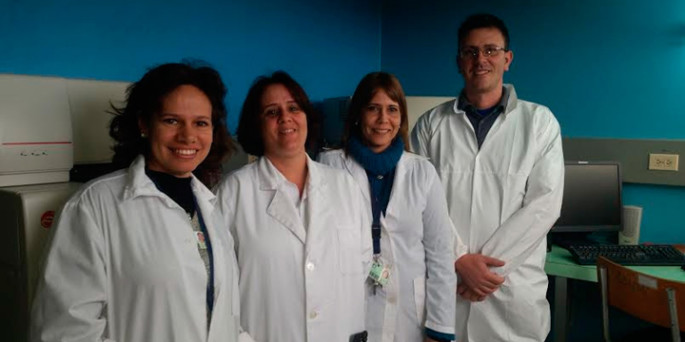
Foreign press manipulates data on AIDS in Cuba
The news of the discovery in Cuba of a recombinant form of HIV that progresses rapidly to AIDS has been disseminated by various media outlets in recent days.
The news was the result of a joint international project by the University of Liège and the Catholic University of Leuven (both in Belgium) and the Pedro Kouri Institute of Tropical Medicine (IPK) in Cuba.
A misinterpretation by the Miami newspaper El Nuevo Herald raised ethical questions about the treatment given by Cuban doctors to the infected patients who took part in this study.
Professor and chief researcher Vivian Kourí, Ph.D., a second-degree specialist in microbiology who works at the Sexually Transmitted Diseases laboratory (ITS) at the IPK’s Virology Department, said:
“The wrong manipulation did not appear in most of the media but in some very specific media that attempt to discredit the Cuban health system and take advantage of everything to do so, no matter how senseless it may be.
“The Belgian counterpart of the research has been in contact with [those media] and has refuted some wrong opinions, asking them to re-read the research so that it may not be misconstrued.
“[Those media] reported that we waited three years before treating the patients, in violation of ethics. That was not so. It is totally false.”

Kouri explains that the research did not interfere with the course of the disease, its evolution, or the treatment of the patients. To say that the rapid progress to AIDS was known in advance and was not treated is a misinterpretation. The infected subjects were followed up according to the rules.
Until 2010, anti-retroviral therapy (ARV) was given to patients who showed a count below 200 CD4 cells. Nevertheless, it was recommended to give the treatment to infected subjects with fewer than 350 CD4 cells, so the patient might deteriorate less quickly and his response to therapy might be more effective.
“In the case of this investigation, there were patients with a cell count close to 200 who were immediately given the treatment,” Dr. Kouri said. “None of the patients had received anti-retroviral therapy (ARV) at the time the sample was taken. Of course, as soon as AIDS was diagnosed, they were treated.”
Research on the aggressive variant of HIV
The research, published weeks ago in the magazine EBioMedicine, began after some patients were seen to progress from HIV to AIDS in an accelerated manner.
Without treatment, Human Immunodeficiency Virus infection (HIV) takes between 5 and 10 years before progressing to the Acquired Immunodeficiency Syndrome (AIDS), although this occurs most commonly between 8 and 10 years. This study reported cases of patients who progressed to AIDS in less than three years.
“A total of 95 infected individuals were studied, in three control groups,” Kouri said. “The first one was composed of 52 individuals who progressed rapidly to AIDS in less than three years. A second one was composed of 21 persons with the same period of HIV infection but without clinical, virological or immunological indicators of progression to AIDS.
“The third one was composed of 22 patients with 7-to-9-year diagnoses of HIV, who were positive for AIDS at the time of the diagnosis.”
The study determined that an aggressive variant of HIV, called CRF19, provokes a rapid progression to AIDS.
This variant, of African origin but relatively frequent in Cuba, represents between 17 percent and 20 percent of the subtypes of HIV in the country. The most frequent variant is subtype B (32-34 percent), followed by BG (22-24 percent), and CRF19.
“There has been a slight increase of this last strain in recent years, but it can’t be said that it is representative,” the doctor said. “Besides, one has to consider that the statistics come from a sample, not from the totality of Cuban patients.”
Dr. Kouri adds that, for the HIV to enter human cells, it must first anchor in, or adhere to, them. This, it does through CD4 cell receptors and co-receptors (CCR5 and CXCR4), which are proteins present in the cell membrane.
During the early stages of infection, the virus uses protein CCR5 as its receptor. After a few years of infection, the virus changes its characteristics and uses CXCR4 as a co-receptor. This change in the use of a co-receptor coincides with its rapid progression to AIDS.
On this subject, there is prior research: “Factors Associated With Rapid Progression to AIDS in Cuban Individuals.”
The peculiarity of this, more aggressive variant is that it makes the transition more rapidly. The virus utilizes the co-receptor CXCR4 early in the infection, shortening the asymptomatic phase of HIV infection and leading to a rapid progression to AIDS.
As to the response of the infected patients to medication, Dr. Kouri explains that the levels of resistance to ARV medication are not associated with the CRF19 strain or the rapid progressors. The treatment for these patients should be equally effective.
Cuba is one of the countries with the lowest index of infection in the region. It has remained stable in recent years, without peaks of contagion. Compared with other countries, the prevalence in Cuba is low, only 0.1 percent of the total population.
[Photo at top: The Cuban team of researchers. From left: Ana Beatriz Pérez Díaz, Lissette Pérez Santos, Vivian Kourí Cardellá and Yoan Alemán Campos.]
(With information from CubaSí / Claudia Padrón Cueto and Jorge Carlos de La Paz/ Translate: Progreso Weekly)

